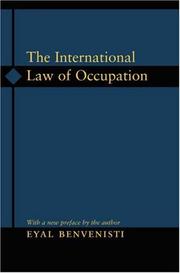| Listing 1 - 10 of 45 | << page >> |
Sort by
|

ISBN: 0691056668 9780691056661 Year: 2004 Publisher: Princeton (N.J.) Princeton university press
Abstract | Keywords | Export | Availability | Bookmark
 Loading...
Loading...Choose an application
- Reference Manager
- EndNote
- RefWorks (Direct export to RefWorks)
Book
ISBN: 1108158013 1108158854 1316536300 1107145961 131650932X Year: 2017 Publisher: Cambridge : Cambridge University Press,
Abstract | Keywords | Export | Availability | Bookmark
 Loading...
Loading...Choose an application
- Reference Manager
- EndNote
- RefWorks (Direct export to RefWorks)
As Israel's control of the Occupied Palestinian Territory nears its fiftieth anniversary, The Writing on the Wall offers a critical perspective on the international law of occupation. Advocating a normative and functional approach to occupation and to the question of when it exists, it analyzes the application of humanitarian and human rights law, pointing to the risk of using the law of occupation in its current version to legitimize new variations of conquest and colonialism. The book points to the need for reconsidering the law of occupation in light of changing forms of control, such as those evident in Gaza. Although the Israeli occupation is a main focal point, the book broadens its compass to look at other cases, such as Iraq, Northern Cyprus, and Western Sahara, highlighting the role that international law plays in all of these cases.
Book
ISBN: 2940503397 2940503400 Year: 2013 Publisher: Graduate Institute Publications
Abstract | Keywords | Export | Availability | Bookmark
 Loading...
Loading...Choose an application
- Reference Manager
- EndNote
- RefWorks (Direct export to RefWorks)
All across the globe, individuals mobilize international support in defense of Palestinian rights and a resolution to the Israeli-Palestinian conflict. However, these international activists are neither the beneficiaries of their efforts nor do they closely identify with the Palestinian population. Through an ethnographic analysis of social movement organizations and international activists active in the West Bank, this paper tries to understand the emergence of transnational collective action fighting for Palestinian rights since the second Intifada. To do so, this paper addresses structural as well as personal factors behind activists’ mobilization. Combining elements from social movement theory and Bourdieusian sociology, I conduct a meso-level inquiry of the principal solidarity organizations alongside a micro-level investigation of international volunteers participating in such organizational structures. Highlighting the specificity of transnational activism in the West Bank both in terms of opportunity structures and the lived experiences of international activists, I have tried to provide insight on how and why the Palestinian rights movement is able to gather so much international support.
Gender & Ethnic Studies --- Social Sciences --- Ethnic & Race Studies --- belligerent occupation --- security --- identity --- human rights --- culture religion and identity --- non-state actors and civil society --- conflict security and peacebuilding --- democracy --- governance --- religion
Book
ISBN: 2940415447 294041548X Year: 2011 Publisher: Graduate Institute Publications
Abstract | Keywords | Export | Availability | Bookmark
 Loading...
Loading...Choose an application
- Reference Manager
- EndNote
- RefWorks (Direct export to RefWorks)
Since the mid-19th century military powers and various writers have tried to define the notion of belligerent occupation and, in particular, the beginning thereof. There are many situations in which a state of occupation is controversial or even denied. When is control so effective that an invasion turns into a state of belligerent occupation? What is the minimum area of a territory that can be occupied; a town, a hamlet, a house or what about a hill taken by the armed forces? This paper examines what seems to be an important gap of the Fourth Geneva Convention: contrary to the Hague Regulations of 1907 it does not provide a definition of belligerent occupation. It is argued that the Fourth Geneva Convention follows its own rules of applicability and that therefore the provisions relative to occupied territories apply in accordance with the “functional beginning” of belligerent occupation approach from the moment that a protected person finds him or herself in the hands of the enemy. Henry Dunant Prize 2010 from the Geneva Academy of International Humanitarian Law and Human Rights (ADH Geneva)
International Law --- Law, Politics & Government --- Treaties, International --- Geneva Convention Fourth (1949) --- belligerent occupation --- protection of civilians --- dispute settlement --- conflict security and peacebuilding --- International Committee of the Red Cross (ICRC) --- humanitarian action
Book
ISBN: 9780521896375 9780511818257 9780521720946 052172094X Year: 2009 Publisher: Cambridge Cambridge university press
Abstract | Keywords | Export | Availability | Bookmark
 Loading...
Loading...Choose an application
- Reference Manager
- EndNote
- RefWorks (Direct export to RefWorks)
Military occupation. --- War (International law) --- War (International law). --- Military occupation --- Hostilities --- International law --- Neutrality --- Belligerent occupation --- De facto doctrine (International law) --- Occupation, Military --- Occupied territory --- Armed Forces in foreign countries --- Conquest, Right of --- Military government

ISBN: 0429228759 1134931603 1280327359 0203317327 0203143469 9781134931606 9780203143469 0415058465 9780415058469 0415058465 9781134931552 9781134931590 113493159X 9780429228759 9781280327353 9780203317327 Year: 1992 Publisher: Savage, Md. : Barnes & Noble Books,
Abstract | Keywords | Export | Availability | Bookmark
 Loading...
Loading...Choose an application
- Reference Manager
- EndNote
- RefWorks (Direct export to RefWorks)
In this exploration of the nature of occupation, Eric Carlton concentrates on the complex relationship between military authority and civilian population and explores the methods used by dominant powers ot maintain their authority. Drawing from a wide range of case studies, including examinations of British colonial interests in India and the Nazi atrocities of the Second World War, Dr Carlton assesses the nature of social control and the effect of ideology on the exercising of power, and considers the moral aspects of military repression.
Military government --- Military occupation --- Colonies --- Colonial administration --- Public administration --- Belligerent occupation --- De facto doctrine (International law) --- Occupation, Military --- Occupied territory --- Armed Forces in foreign countries --- War (International law) --- Conquest, Right of --- Military rule --- Civil-military relations --- History. --- Administration.
Book
ISBN: 1474418678 0748676023 9781474418676 9780748676002 0748676007 9780748676026 9780748675999 074867599X 074867599X 9780748675999 147442841X 9781474428415 Year: 2016 Publisher: Edinburgh Edinburgh University Press
Abstract | Keywords | Export | Availability | Bookmark
 Loading...
Loading...Choose an application
- Reference Manager
- EndNote
- RefWorks (Direct export to RefWorks)
An understanding of military occupation as a distinct phenomenon first emerged in the 18th century. This book shows how this understanding developed and the problems that the occupiers, the occupied, commentators and the courts encountered.
Military occupation --- Belligerent occupation --- De facto doctrine (International law) --- Occupation, Military --- Occupied territory --- Armed Forces in foreign countries --- War (International law) --- Conquest, Right of --- Military government --- History. --- HISTORY / Military / General. --- Military occupation.
Book
ISBN: 1107201705 1283330296 9786613330291 1139134809 1139129759 1139133691 0511504799 0511818254 0511506937 9781139129756 9781139134804 9780521896375 0521896371 9780521720946 052172094X 9780511506932 9780511818257 9781107201705 9781283330299 6613330299 9781139133692 9780511504792 Year: 2009 Publisher: Cambridge New York Cambridge University Press
Abstract | Keywords | Export | Availability | Bookmark
 Loading...
Loading...Choose an application
- Reference Manager
- EndNote
- RefWorks (Direct export to RefWorks)
The customary law of belligerent occupation goes back to the Hague and Geneva Conventions. Recent instances of such occupation include Iraq, the former Yugoslavia, the Congo and Eritrea. But the paradigmatic illustration is the Israeli occupation, lasting for over 40 years. There is now case law of the International Court of Justice and other judicial bodies, both international and domestic. There are Security Council resolutions and a vast literature. Still, numerous controversial points remain. How is belligerent occupation defined? How is it started and when is it terminated? What is the interaction with human rights law? Who is protected under belligerent occupation, and what is the scope of the protection? Conversely, what measures can an occupying power lawfully resort to when encountering forcible resistance from inhabitants of the occupied territory? This book examines the legislative, judicial and executive rights of the occupying power and its obligations to the civilian population.
Military occupation. --- War (International law) --- Hostilities --- International law --- Neutrality --- Belligerent occupation --- De facto doctrine (International law) --- Occupation, Military --- Occupied territory --- Armed Forces in foreign countries --- Conquest, Right of --- Military government --- Law --- General and Others
Book
ISBN: 9781469628127 1469628120 9781469626963 1469626969 9781469626956 1469626950 9798890849519 Year: 2016 Publisher: Chapel Hill
Abstract | Keywords | Export | Availability | Bookmark
 Loading...
Loading...Choose an application
- Reference Manager
- EndNote
- RefWorks (Direct export to RefWorks)
In the early 20th century, the US set out to guarantee economic and political stability in the Caribbean without intrusive military interventions - and ended up achieving the opposite. Using military and government records from the US and the Dominican Republic, this work investigates the extent to which early 20th century US involvement in the Dominican Republic changed both Dominican history and the conduct of US foreign policy.
Military occupation --- Belligerent occupation --- De facto doctrine (International law) --- Occupation, Military --- Occupied territory --- Armed Forces in foreign countries --- War (International law) --- Conquest, Right of --- Military government --- Social aspects --- United States --- Dominican Republic --- Foreign relations --- Politics and government --- History
Book
ISBN: 1108572774 1108671470 1108497977 1108571174 Year: 2019 Publisher: Cambridge : Cambridge University Press,
Abstract | Keywords | Export | Availability | Bookmark
 Loading...
Loading...Choose an application
- Reference Manager
- EndNote
- RefWorks (Direct export to RefWorks)
Belligerent occupations existed in both World Wars and have occurred more recently in all parts of the world (including Iraq, Afghanistan, the former Yugoslavia, Congo, Northern Cyprus, Nagorno-Karabakh, Georgia, Eritrea and Ethiopia). Owing to its special length - exceeding half a century and still in progress - and the unprecedented flow of judicial decisions, a special focus is called for as regards to the occupation of Palestinian territories by Israel. International law addresses the subject of belligerent occupation in some detail. This second, revised edition updates the text (originally published in 2009) in terms of both State practice and doctrinal discourse. The emphasis is put on decisions of the Security Council; legislation adopted by the Coalition Provisional Authority in Iraq; and predominantly case law: international (Judgments of the International Court of Justice, the International Criminal Tribunal for the Former Yugoslavia and the European Court of Human Rights; Advisory Opinions and Arbitral Awards) as well as domestic courts.
Military occupation. --- War (International law) --- Hostilities --- International law --- Neutrality --- Belligerent occupation --- De facto doctrine (International law) --- Occupation, Military --- Occupied territory --- Armed Forces in foreign countries --- Conquest, Right of --- Military government
| Listing 1 - 10 of 45 | << page >> |
Sort by
|

 Search
Search Feedback
Feedback About UniCat
About UniCat  Help
Help News
News